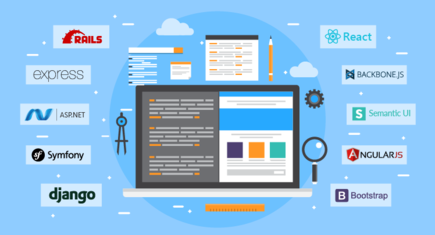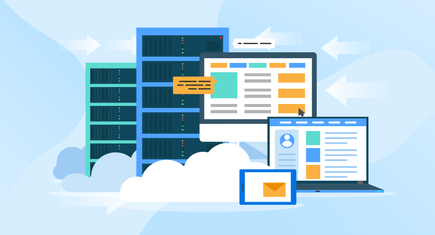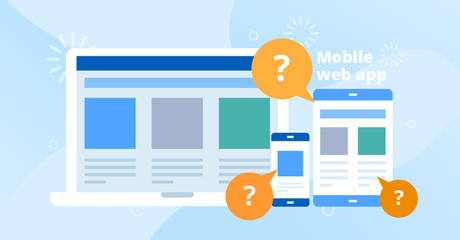Editor's note: The practical use of a web application defines its functional type. ScienceSoft's experience in web app development shows that it's important to choose and discuss this type with the Customer at the very early stages of cooperation. Read on to get a gist of what each web app type is best for and don't hesitate to contact our web app development experts if you have some questions.
Classification of web apps is quite complex and multifaceted. Asking about the web app types without specific criteria in mind can get you at least three different and equally valid answers. These answers will list numerous types of web apps that differ from each other in various ways: how their components are interconnected, how app and business logic are distributed, how they look and what they serve for.
We’ve already covered the first two technology-focused classifications here and discussed the architecture, models and components of web apps. This time, we set our eyes on functional types of web applications, their features, examples, and use-cases.

Web Portals
As the word ‘portal’ suggests, this is a point on the Internet that serves as a single outlet to multiple features. Some of the most popular web portal features (that aren’t necessarily used together) include published content, access to email, personal profile, and financial transactions. The key moment is that all these features should work in a self-service manner; in other words, a portal should provide automated functionality that will let users complete their tasks on their own.
Many kinds of web portals exist and are different in the set of features they offer. B2C/B2B trade portals unify multiple e-shops or businesses and allow a user to view, compare and order the offers. Patient portals give patients access to their private data and enable appointment scheduling. Enterprise portals provide employee profile database, event calendars, corporate news and vacation planners. In fact, any community with shared needs and interests can benefit from using a web portal.
Enterprise web apps
Instead of catering to the general needs of an entire company the way an enterprise web portal does, enterprise web apps address the challenges of more specific user groups: departments, project teams, etc. There can be multiple features available here too, but all of them should have a common goal of coordinating the staff’s workflow and helping them to be productive.
It’s easier to imagine an enterprise web app as a regular desktop application used by employees in their daily workflow but made available online for the sake of data sharing convenience and easy remote access. A customer relationship management web app can be a good example of this type: since the data contained in this system belongs to a company and should be easily available to every currently working employee, it makes perfect sense for the system to be online-based.
Business automation web solutions
Apart from facilitating the lives of company employees with enterprise web apps and company web portals, many businesses also implement web solutions that offer significant changes to the entire workflow. These changes usually involve automation of routine tasks that have to be manually attended to by a person responsible for them.
Web app development of business automation solutions can target general business tasks (like those involving documentation flow), as well as for very specific industry-related processes (like a healthcare revenue management app that interoperates with EHR on one side and with payers’ systems on the other.) By taking care of, for instance, request acceptance and data coordination, these web apps let employees focus on substantial, less tedious work.
Ecommerce web apps
Moving away from the subject of business automation web solutions that are mostly lucrative for medium-sized and large enterprises, we come to the type of web solution that plays an important role in small and large businesses alike. The category of ecommerce web apps is quite vast and includes all kinds of e-shops (B2B, B2C, B2A, etc.) as well as booking systems (transportation, lodging, entertainment, etc.).
The main components are, unsurprisingly, grids/lists of products or services, product/service details, as well as a shopping cart and secure e-payment options. If a business wants to improve their customer loyalty and retention or gather customer data, it can also introduce registration and a personal profile.
Ecommerce web frameworks, such as Magento, can facilitate maintenance of these feature-rich web apps by introducing a user-friendly administration panel. A content manager of an ecommerce web app with Magento system installed will need zero special knowledge about web apps in order to freely update product catalogs, launch special offers, and manage customer database.
Microsites
Microsites are web apps with a small amount of pages and hence - a very concise menu. Their main idea is to represent a company or promote an event online by giving a general overview and leaving necessary contact information.
Despite a seemingly simple functionality, these web apps can be very complex, highly interactive or heavily animated if a business is trying to make a strong impression or has to cultivate an already successful public image. In fact, these web apps can be the most creative ones in terms of design because they aren’t limited by any specific features; they can simply enjoy infinite opportunities of today’s web application development technologies.
Endnote
Different types of web applications can be useful to businesses in different ways. Web portals are convenient gateways to a variety of features that are gathered in one place, for a particular audience. Online-available internal business apps significantly facilitate company data sharing. Business automation solutions connect in-house systems and allow easy remote control. And finally, customer-facing web apps can be as simple as a one-page microsite or as complex as an ecommerce web app with over 100,000 items.

Ready to upgrade your current website and drive user engagement with a web application? ScienceSoft is here to help.



